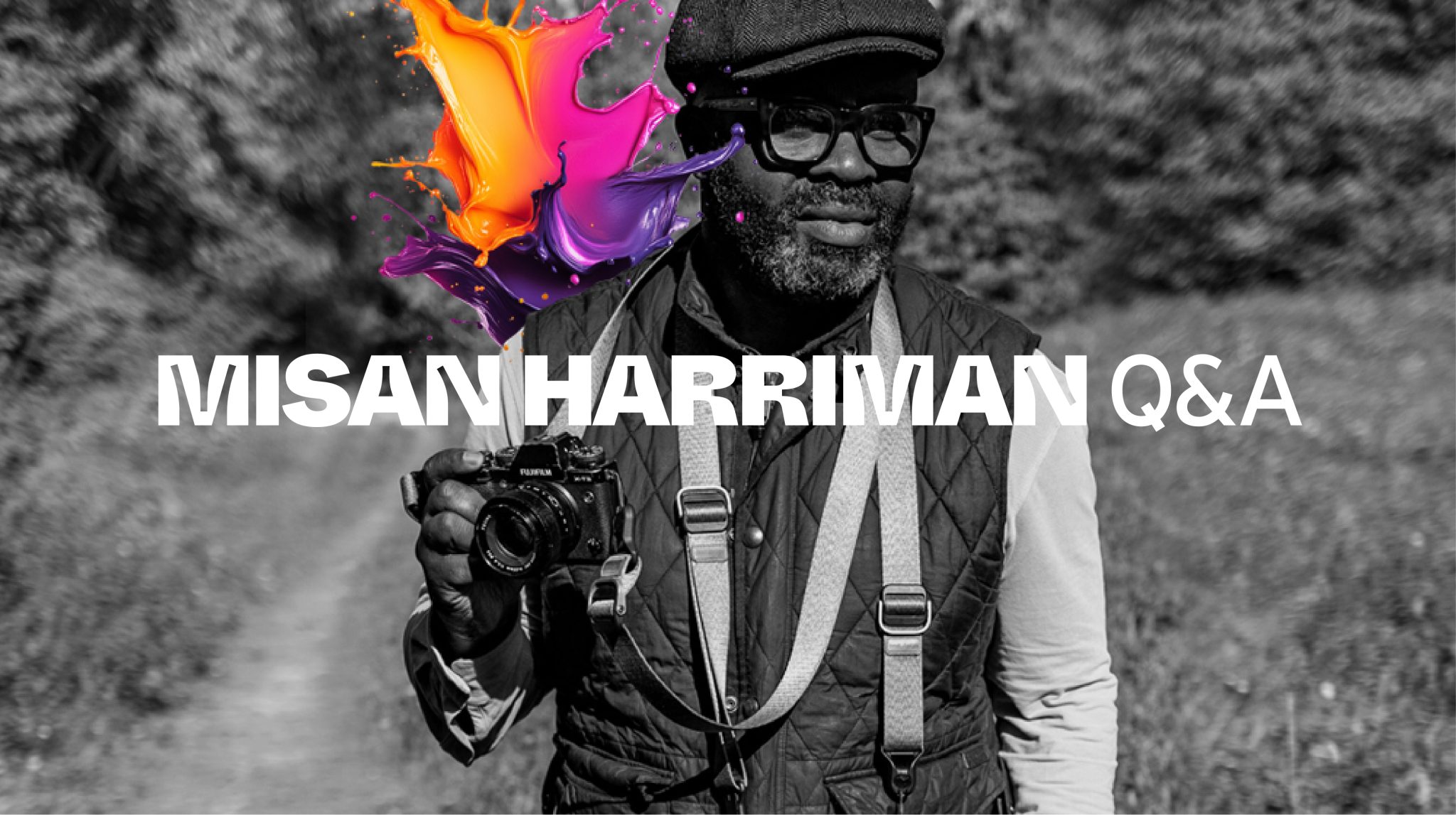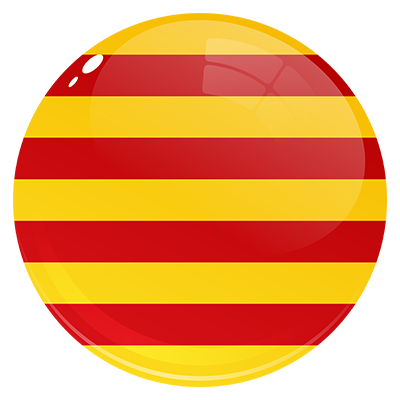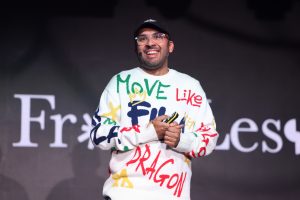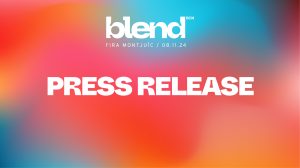
Misan Harriman Q&A
What role does collaboration and multidisciplinary input play in your creative process?
It’s fundamental to what I do… which I think is why I sometimes struggle calling myself a ‘photographer’. There’s a fluidity in my willingness and need to express myself artistically. That can be from my curatorial ability online, finding great art and sharing it. It can be from some of the poetry that I’ve written. It could be in the film that I’ve just made, that very luckily got nominated for an Academy Award. And, of course, the multiplicity of the photography I do, which is how I observe the human condition.
As a storyteller, the tools I need could be anything from understanding how to express myself online and the new metaverses that are being created as we speak, to holding a camera and shooting human beings at protests or at film premieres. A lot of people like to describe artists as though they’re a protest photographer, or a celebrity portrait taker, or a filmmaker, or that they love spoken word and poetry. For me, it’s all a story. I’m a storyteller that uses art to express myself, and whatever technology is availed to me, if it amplifies what I’m trying to say, then it’s a tool I’m willing to use.
How is tech influencing your own creativity, both now and in the future?
The world would never have discovered me if it wasn’t for tech and the borderless reach of the social media age that we live in. My images went viral in a way that would have been literally impossible for it to happen in the traditional sense of the word. I didn’t have to beg a fancy gallery or curator or hope critics liked my work. They were seen by millions of people who had a groundswell of emotive reactions that ultimately led to me shooting the cover of British Vogue.
It’s really interesting how artists can now have a voice through technology that would otherwise have been gate kept. What happens if you’re the next Gordon Parks or Picasso or Damien Hirst or Banksy, but you were born in Nicaragua or Mogadishu? Which fancy critic and curator based in Mayfair is going to come across a young girl who can do things no one can with her paintbrush? There’s an amazing artist I’ve been mentoring called Blessing, from Nigeria, who only takes photographs on her iPhone. When I sent her work to Apple, even they were confused! She found a way to get out there with minimal resources and make world-class art that the world is able to see.
I love what Adobe’s doing with Lightroom – not to enhance your image, but to clarify, to give it the full fidelity that you want. What’s happening in filmmaking is extraordinary too. Digital film these days is looking like the actual 35mm film – you can barely tell the difference. It’s become that good. It’s not trying to become more futuristic. It’s just using the technology we have today to to represent what is more accessible to people. Anything that makes being an artist more accessible is really interesting to me.
The other area is the crypto space. Unfortunately, it’s become a bit of a mess because of greed and hubris, but the underlying technology is incredible. Irrevocable proof of provenance for an artist is very powerful. I think as time goes by, technology embedded with an artist’s work could become another medium that really helps the artists be able to support themselves in being the great creators they’re supposed to be.
From a personal point of view, because my mind isn’t neurotypical, if I didn’t have the Grammarly app on my phone it’d be like a drunk person was trying to talk to you! Apple is bringing out the next iOS update, Apple Intelligence, which is built into the whole ecosystem on your phone. Basically, it’s an AI-powered tool that summarises all the things you need, and checks your spelling and grammar in real time. For someone like me, that’s life changing. There’ll be a software update that is capable of helping these challenges disappear and allowing me to function at the level that I’d like to.
Being a visual learner, I’m able to pick up a camera and figure out how to express myself with it through YouTube tutorials. And because they they help you without judgment, you can learn pretty fast… you can fail and fail and fail until suddenly you don’t fail anymore. That’s really helped make me the filmmaker and the photographer I am today.
Why do you think it is so important for diverse voices and experiences to be represented in creative endeavour?
I believe it makes the human experience for all of us that bit more honest. It’s actually the thing that defeats fear. You know, when people go down Reddit rabbit holes and end up becoming racist and far right, or hating those they don’t know, it’s because they haven’t had access to the lived experience of others. Some of the most open-minded people you meet are those who have travelled and seen the world. When you observe how people live, how they eat, how they love, how they mourn, how they raise their kids, it gives you a better understanding of life. So if we’re only having a tiny group of people tell our stories, it nullifies and reduces so much of the world to a place that is actually quite dangerous.
If you look at the Cannes Film Festival this year, many films from – and I hate the term the ‘Global South’ – places like India, Afghanistan and Iran won prizes. It shows there’s a real hunger to experience art by people that have a different lived experience. Human beings have always loved the campfire, and the man or woman that traveled the most would have the best stories when they came back to tell them. So why should we just have people that want to tell the same distilled stories that all of us are pretty bored of anyway? And it’s not about giving people a handout. It’s a merit-based opportunity. Why don’t we look for great voices from all walks of life, and if they are that good, let’s walk them into the room without fear or favour?
If you look at the [Paris 2024] Olympics, it’s probably the happiest I’ve seen humanity this year. I didn’t see people angry that they had that on their screens. It’s a very simple thing, and I think that above and beyond being entertained, it actually helps our mental health.
What creative projects have got coming up that you’re particularly excited about?
I’ve just finished my big, feature length documentary with Paramount. Andy Mundy-Castle, who just won a BAFTA for his extraordinary documentary, ‘White Nanny, Black Child’, directs it. It’s an observation of me and activism and what the legacy of George Floyd’s death is almost five years on. Hopefully we’ve made a film that helps people understand how important it is to build bridges. So I can’t wait for that to come out. We plan to drop it at one of the big festivals next year.
I’ve also just completed a very important photo project shooting black children with Down’s syndrome. Most children that have challenges are never really represented very well… and if you drill down to black children with challenges, it’s nowhere to be seen. So I want to have my lens on them and tell their stories. Hopefully we’ll have everything ready for Black History Month [in October 2024].
I also just shot one of my idols, Steve McQueen, for a big magazine. That was my last shoot I can talk about. Beyond that, there are many, many things I’m doing with my work with Save the Children, and, of course, making sure that culture is accessible for all in the eleven acres that is the South Bank Centre. We have lots of things planned for our 75th anniversary in 2026, so keep an eye out for news of that!
Misan will be appearing at Blend Barcelona on 8th November 2024. His Spotlight Presentation (Narrative Alchemy: The World Is On Fire) will take us on a journey through his pioneering creative approaches and groundbreaking storytelling techniques.
Interview conducted on 9th September 2024.
Blog Category
- PULSE
- News
- Press Release
- Q&A
Latest Blog
Permission to Play: Manon Dave on Creativity and the Power of Play
Manon Dave sharing his journey, philosophy on creativity, and an...
Read MoreOctober 2024: Gaza art installation confirmed
New Barcelona-based creative industry festival Blend is set to have...
Read MoreOctober 2024: GucciGhost to headline Blend
Exciting new Barcelona-based creative festival Blend set to showcase unseen...
Read MoreSeptember 2024: Creative industry backs new festival
Major global powerhouses Nike, Snapchat and Ogilvy have joined key...
Read More
 CA
CA
 ES
ES

